Leadership Insights is ASPA's e-publication highlighting unique perspectives on timely public administration topics. It is designed to offer members a resource that is relevant, interesting and readable. Below is a catalog of the
Insights that have been produced thus far; check back for future publications.
Building Public Administration Back, Better and Global
By Müge Kökten Finkel and Melanie Hughes
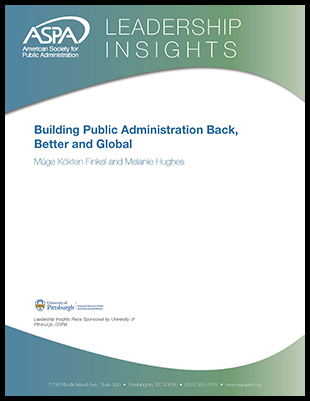
Provided by the Graduate School of Public and International Affairs at the University of Pittsburgh, this publication brings their faculty's expertise to the ASPA community on a very important subject: gender equality in public administration.
As noted by GSPIA Dean Carissa Slotterback, "As we continue to make progress in professionalizing and building capacity in public administration around the world, we also know that this progress continues to be unequal. Context matters and is essential as we aim a comparative lens across the world, but see some persistent challenges in terms of gender equality. A recent report based on evidence from the United Nations Development Programme and the University of Pittsburgh's ground-breaking Gender Equality in Public Administration database shines a bright light on these issues. This research, examining 170 countries, highlights the prevalence of glass ceilings that limit women's advancement to positions with greater power and influence and glass walls that frequently limit their leadership to "women's issues" such as health and education.
This work also offers inspiration as we reflect on the extraordinary impact women have in agencies and ministries across the world, as well as crucial insights on the interventions that we must pursue as we strive for progress in meeting UN Sustainable Development Goal (SDG) #5: Gender Equality. Most importantly, it creates an imperative for all of us as we consider the ways that we can support women's empowerment and expanded leadership in public administration. I am grateful to my University of Pittsburgh Gender Inequality Research Lab colleagues, and their UNDP partners, for this much needed data and insight on our path forward."
About the Authors
Müge Kökten Finkel is director of the Ford Institute for Human Security. a faculty member at the Graduate School of Public and International Affairs and codirector of the Gender Inequality Research Lab (GIRL) at the University of Pittsburgh. Her expertise includes gender and development, poverty and inequality, and Japanese politics. Previously, she worked as social development specialist for the MENA Region at the World Bank. She collaborates with the United Nations Development Programme to analyze global trends in gender equality in public administration. Finkel holds a Ph.D. in political science from the University of Virginia.
Melanie Hughes is professor of sociology and codirector of the Gender Inequality Research Lab (GIRL) at the University of Pittsburgh. Her research focuses on gender equality in politics and public administration worldwide. She is co-author of Women, Politics, and Power: A Global Perspective (4th Edition, Rowman & Littlefield 2020) and Gender Equality in Public Administration (UNDP 2021). She co-leads the Ford Institute for Human Security research group on Gender Equality in Public Administration (GEPA), a collaborative research effort with the United Nations Development Programme (UNDP).
The Value of Public Service
By Joseph R. Biden, Jr.
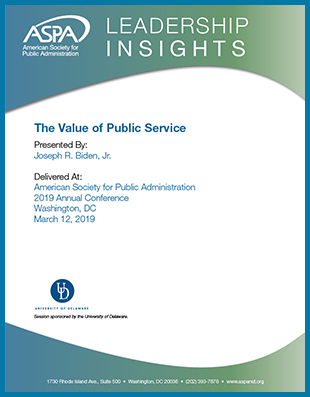
Focusing on the important role public service and public administration play in our democracy,
The Value of Public Service encourages us to remain steadfast in our passion for public service and our dedication to its future.
Taken from the written remarks Vice President Biden delivered at ASPA's 2019 Annual Conference, this publication is an insightful look at public service in the 21st century. Mr. Biden encourages scholars and professors to continue to encourage their students into public service and encourages current servants to continue to be the "tenders of the flame" that enables all American citizens to believe in our democracy.
This is an excellent antidote to the malaise that can sometimes overtake our public servants as they work to overcome day-to-day difficulties in the service of advancing excellence.
Click here to access an
interactive digital version of the speech.
About the Author
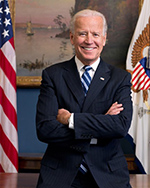
Joseph Robinette Biden, Jr., represented Delaware for 36 years in the U.S. Senate before becoming the 47th Vice President of the United States.
Joseph Robinette Biden, Jr., was born November 20, 1942, in Scranton, Pennsylvania, the first of four siblings. In 1953, the Biden family moved from Pennsylvania to Claymont, Delaware. He graduated from the University of Delaware and Syracuse Law School and served on the New Castle County Council. Then, at age 29, he became one of the youngest people ever elected to the United States Senate.
Just weeks after the election, tragedy struck the Biden family when then Senator-elect Biden's wife, Neilia, and their one-year-old daughter, Naomi, died and his 2 sons were injured in an auto accident. Vice President Biden was sworn into the U.S. Senate at his sons' hospital bedside and began commuting to Washington every day by train, a practice he maintained throughout his career in the Senate.
In 1977, Vice President Biden married Jill Jacobs. Jill Biden, who holds a Doctorate in Education, is a life-long educator and currently teaches at a community college in Northern Virginia. The Vice President's son, Beau, was Delaware's Attorney General from 2007-2015 and a Major in the 261st Signal Brigade of the Delaware National Guard. He was deployed to Iraq in 2008-2009. Beau passed away in 2015 after battling brain cancer with the same integrity, courage, and strength he demonstrated every day of his life. The Vice President's second son, Hunter, is an attorney who manages a private equity firm in Washington, D.C. His daughter Ashley is a social worker and Executive Director of the Delaware Center for Justice. Vice President Biden has five grandchildren: Naomi, Finnegan, Roberta Mabel ("Maisy"), Natalie, and Robert Hunter.
As a Senator from Delaware for 36 years, Vice President Biden established himself as a leader in facing some of our nation's most important domestic and international challenges. As Chairman or Ranking Member of the Senate Judiciary Committee for 17 years, then-Senator Biden was widely recognized for his work on criminal justice issues, including the landmark 1994 Crime Act and the Violence Against Women Act. As Chairman or Ranking Member of the Senate Foreign Relations Committee for 12 years, then-Senator Biden played a pivotal role in shaping U.S. foreign policy. He has been at the forefront of issues and legislation related to terrorism, weapons of mass destruction, post-Cold War Europe, the Middle East, and Southwest Asia.
As the 47th Vice President of the United States, Joe Biden continued his leadership on important issues facing the nation and represented America abroad, traveling over 1.2 million miles to more than 50 countries. Vice President Biden convened sessions of the President's Cabinet, led interagency efforts, and worked with Congress in his fight to raise the living standards of middle class Americans, reduce gun violence, and address violence against women. In the final year of the Administration, Vice President Biden led the Cancer Moonshot, an international effort to end cancer as we know it.
Since leaving the White House in January 2017, Vice President Biden has continued his legacy of expanding opportunity for all, both in the United States and abroad, with the creation of the Biden Foundation, the Penn Biden Center for Diplomacy and Global Engagement at the University of Pennsylvania, the Biden Cancer Initiative, and the Biden Institute at the University of Delaware. Through these non-profit organizations, Vice President Biden and Dr. Biden are developing programs designed to advance smart policies, convene experts and world leaders on the issues they care most about, and impact the national debate about how America can continue to lead in the 21st century. In addition, Vice President Biden formed a political action committee, "American Possibilities," which will allow him to continue to support Democratic candidates and causes across the country.
Finally, in November 2017, Vice President Biden released his second book, Promise Me, Dad: A Year of Hope, Hardship, and Purpose. The book, a New York Times #1 Bestseller, is a personal story from a father, grandfather, husband, and friend as he confronts the inevitability of devastating personal loss, while trying to balance his duty to his family and his country.
He has received numerous awards and accolades, including the National Civil Rights Museum's Freedom Award and the Medal of Freedom with Distinction. In December of 2018, the University of Delaware named its school of public policy the Joseph R. Biden, Jr. School of Public Policy and Administration.
The Administrative Presidency and Fractious Federalism: Lessons from Obamacare
By Dr. Frank Thompson
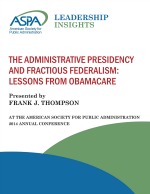
Transformative in scope, the Affordable Care Act was heralded by many as the legacy-making accomplishment of President Obama's first term in office. Its implementation was criticized by just as many who singled out its haphazard and technologically flawed execution. In
The Administrative Presidency and Fractious Federalism: Lessons from Obamacare, we proudly feature Frank Thompson, a renowned scholar on intergovernmental relations, policy implementation and health policy. Dr. Thompson explores the fascinating and often fragile relationship between the president and states with a special focus on the ACA.
ASPA offers this issue of
Leadership Insights as a resource for our members specifically involved with implementation at the state and local level. More generally, we know that all those who work in or study the intergovernmental arena will have a keen interest in Thompson’s assessment of the state of federalism under the ACA.
About the Author:

Dr. Frank J. Thompson is a nationally renowned scholar of politics and administration, implementation, public management and health policy. In 2007, Thompson received a Robert Wood Johnson Investigator Award to study the evolution of Medicaid during the Clinton, George W. Bush and Obama administrations. The research led to his book,
Medicaid Politics: Federalism, Policy Durability, and Health Reform, a thorough examination of the genesis and expansion of Medicaid and its impact on the American health care system.
Thompson is a fellow of the National Academy of Public Administration, a past president of the National Association of Schools of Public Affairs and Administration, and former executive director of the National Commission on State and Local Public Service (Winter Commission). He has received several awards, including ASPA’s Donald C. Stone Distinguished Scholar Award for his accomplishments in the field of intergovernmental relations and management. In 2008, Thompson joined the School of Public Affairs and Administration at Rutgers University-Newark and became an affiliated faculty member of the Rutgers Center for State Health Policy in New Brunswick. Prior to his tenure at Rutgers, he served as dean of the Rockefeller College of Public Affairs and Policy at the University at Albany, State University of New York. Thompson is an alumnus of the University of Chicago where he earned his bachelor’s degree in political science and the University of California, Berkeley, where he received his doctoral and master’s degrees in the same discipline.
Reflections of Title IX
By Dr. Bernice Sandler
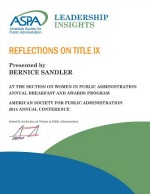
This issue of
Leadership Insights features Dr. Bernice Sandler and Title IX, the historic legislation prohibiting discrimination in education on the basis of gender. Known as the ‘Godmother of Title IX,’ Dr. Sandler initially shared her reflections on the statute during ASPA’s Section on Women in Public Administration (SWPA) Awards Breakfast in March 2014. Dr. Sandler has conducted groundbreaking research on gender and spoken widely on the "chilly climate," a term she coined, on the campuses of higher education institutions.
In this edition of Leadership Insights, she provides a historical and deeply personal reflection on the journey to get Title IX passed and its impact. Most commonly known as the "sports law," Dr. Sandler points out that the legislation was inspired by the discriminatory environments in higher education during the 1970s. Since then, it has led to wider implications, like athletics.
About the Author
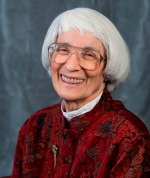 Dr. Bernice Sandler is a senior scholar at the Women’s Research and Education Institute, where she consults with institutions and others about achieving equity for women. She played a major role in the development and passage of Title IX and other laws prohibiting gender discrimination in education, and has been associated with Title IX longer than any other person. The New York Times has referred to her as the “Godmother of Title IX.”
Dr. Bernice Sandler is a senior scholar at the Women’s Research and Education Institute, where she consults with institutions and others about achieving equity for women. She played a major role in the development and passage of Title IX and other laws prohibiting gender discrimination in education, and has been associated with Title IX longer than any other person. The New York Times has referred to her as the “Godmother of Title IX.”
Sandler has a long list of firsts, having produced the first reports on campus sexual harassment, gang rape, campus peer harassment and the ways in which men and women are treated differently in the classroom. She was the first person appointed to a Congressional committee staff to work specifically on women’s issues and filed the first charges of sex discrimination against more than 250 institutions. Sandler has served on more than 30 boards and holds 10 honorary doctorates. She has been quoted in major media including The New York Times and Newsweek and has appeared on many talk shows.
Sandler holds a degree in counseling from the University of Maryland. She was the first chair of the now-defunct National Advisory Council on Women’s Educational Programs, having been appointed by Presidents Ford and Carter. She has taught counseling, and has worked as a psychologist, a research assistant, a nursery school teacher, a guitar instructor and, like many women, a secretary.
Presidential Leadership and Presidential Management
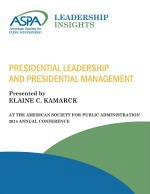 Presidential Leadership and Presidential Management
Presidential Leadership and Presidential Management features remarks from Elaine Kamarck, senior fellow at Brookings and a leading expert on government innovation. Originally presented at the 2014 ASPA Annual Conference, Kamarck’s remarks shed light on why implementation failures are the most devastating ones a president can have. She also tells us what presidents must do when leading complex implementation efforts. To be sure, many of the lessons she shares extend well beyond The White House, and into the work you do every day.
About the Author
 Elaine C. Kamarck is a senior fellow in the Governance Studies program at Brookings and founding director of the Center for Effective Public Management. A public sector scholar, she has vast experience in government, politics and academia. Kamarck is an expert on government innovation and reform in the United States, OECD countries and developing countries. She also focuses her research on the presidential nomination system and American politics. As a senior staffer in the White House she created the National Performance Review, the largest government reform effort in the last half of the 20th century. Following her White House service, she spent 15 years at Harvard University teaching government management and American politics.
Elaine C. Kamarck is a senior fellow in the Governance Studies program at Brookings and founding director of the Center for Effective Public Management. A public sector scholar, she has vast experience in government, politics and academia. Kamarck is an expert on government innovation and reform in the United States, OECD countries and developing countries. She also focuses her research on the presidential nomination system and American politics. As a senior staffer in the White House she created the National Performance Review, the largest government reform effort in the last half of the 20th century. Following her White House service, she spent 15 years at Harvard University teaching government management and American politics.